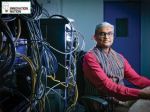
Imagine a world where the cost of intelligence is zero: Sateesh Seetharamiah
EdgeVerve Systems CEO Sateesh Seetharamiah on AI being a game changer in automations, the big picture around the future worker, and the importance of security and data
 Sateesh Seetharamiah, CEO of EdgeVerve Systems
Sateesh Seetharamiah, CEO of EdgeVerve Systems
The idea of what is automatable is changing by the day, and everything that is automatable in an enterprise will get automated, says Sateesh Seetharamiah, CEO of EdgeVerve Systems, the products and platforms subsidiary of Infosys. Edited excerpts:
Q. What are some of the biggest problems that you solve for your enterprise customers?
We have three digital platforms: AssistEdge for intelligent automation, XtractEdge for document digitisation and a supply chain platform space called TradeEdge. More than 400 Global-2000 customers are using them today. Around 70 to 80 percent of the data in enterprises is still unstructured. There is also data that’s not codified, which is how humans really interface and work with systems.
Further, businesses have suppliers and distributors, upstream and downstream. There is also this whole issue of having different languages communicating that data. We help them discover and automate several processes, digitise and manage, move from unstructured data to structured data and also connect with their value chain partners. This becomes the foundation for all other insights and value from the data.
Q. Today, increasingly, this intelligence is coming from an AI (artificial intelligence) program. What is the significance of this difference? What’s the big picture here?
What’s the end goal? That is to make sure that humans actually do what they’re really good at from a young age—creativity, curiosity, innovation, problem solving, empathy. The question is, are humans really using these instincts effectively during their workday?
There are thousands of activities that humans do all over the world in different enterprises which don’t have to be done by them and AI is already, around us, right?
Even in the context of enterprises, I think, AI will become part of everyday work.
There is going to be a world where digital workers (software robots) will do all things that are repetitive, maybe even some of the basic cognitive capabilities that humans have.
They’ll be able to do some of the thinking and essentially, they will start augmenting human thinking and humans will rely on them as another source of insight. That’s how I think this will evolve.
Q. What are some of the pitfalls in deploying automation in general and AI-based automation?
If you look at intelligent automation specifically, one is to identify these opportunities that are really measurable. Otherwise, you’ll never know what you got out of it eventually. Then with respect to digital workers, they have to be taught what to do—this brings its own challenges that need to be managed right.
Even after we deploy these automations, there are so many exceptions. Digital workers need help. They know only certain bits and pieces, and they may not know certain other elements of executing things. Humans will have to manage these exceptions.
Security is obviously a huge thing to keep in mind because these are digital workers which have access to systems. Some of our customers have deployed thousands of digital workers, and such scale brings its own complexity.
More broadly, all of this sits in the context that in the middle are the humans. And when you bring in AI, everything depends on good data.
Also read: Peer Robotics: Making robots doing what you want
Q. Where is all this headed? Would you say that everything that can be automated will get automated?
I don’t think there is any doubt about that. Everything that can be automatable will get automated. Also, the perspective on what is automatable is also changing rapidly. AI is going to be the game changer here.
I think the real big picture is what if the cost of intelligence becomes zero? I think it’s something to ponder on. Infosys was one of the early backers of the possibilities of AI and early backers of the Open AI forum—it’s come a long way in the last eight years and we can see that intelligence, actually the cost of intelligence can become zero. What is automatable? Once people thought, in manufacturing, for example, the factory floor could be automated, but not strategic thinking.
However, things have changed a lot. If you look at the kind of things that intelligent automation has done in the drug discovery in the last two years, it is phenomenal, and that’s just one example.
Q. What opportunities do you see for India because of all these advances?
When we started EdgeVerve, analysts didn’t believe we could build products out of India. Today the top analysts count us among the leaders (for our platforms).
I believe the demographics that we have, the varieties of new interests that we have as a society… these are advantages as we build these mega models and so on. People talk about language models. How many languages do we have in this country if we were to build a model as an example? I think a lot of exciting stuff is possible, in my view, from India and based out of India.
(This story appears in the 24 February, 2023 issue of Forbes India. To visit our Archives, click here.)


















